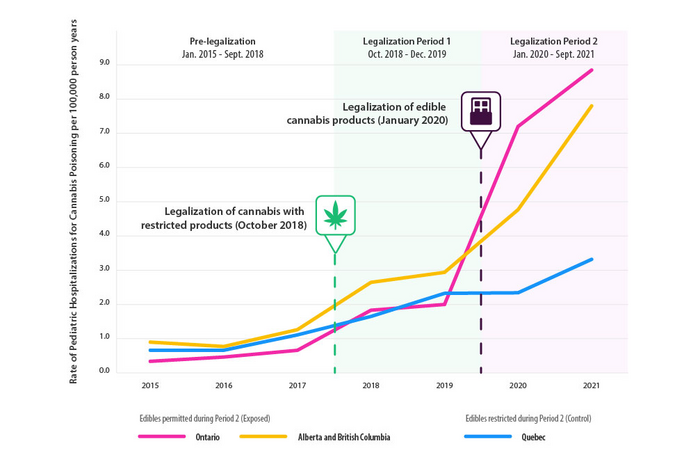Canada has seen a 6.3 fold increase in hospitalizations for unintentional cannabis poisoning among children under the age of 10 since the legalization of recreational cannabis, according to a research letter published in the New England Journal of Medicine.

Credit: Dr. Daniel Myran
Canada has seen a 6.3 fold increase in hospitalizations for unintentional cannabis poisoning among children under the age of 10 since the legalization of recreational cannabis, according to a research letter published in the New England Journal of Medicine.
The study found that hospitalizations for paediatric cannabis poisonings increased substantially across the country. Notably, provinces that permitted the sale of cannabis edibles such as gummies, chocolates and baked goods saw an increase in hospitalizations that was more than two times higher than the province that prohibited the sale of edibles (7.5 times vs. 3.0 times, respectively, from the pre-legalization rate).
“A growing number of countries are moving towards legalizing non-medical or recreational cannabis. As this happens, it’s critical to understand that there are many ways to legalize cannabis and not all are equivalent,” said Dr. Daniel Myran, lead author and family physician, public health and preventive medicine specialist and postdoctoral fellow at the University of Ottawa Department of Family Medicine and The Ottawa Hospital. “Our findings suggest that prohibiting the sale of edible cannabis products like candies, desserts and baked goods is a key policy for preventing large increases in cannabis poisonings in young children after legalization.”
These findings are the result of a unique scenario caused by the staggered roll out of cannabis products in Canada and differences in policy approaches to legalization between provinces.
In October 2018, dried cannabis flower was legalized across Canada, but the sale of cannabis edibles such as gummies, chocolates and baked goods was initially prohibited. Starting in January 2020, Ontario, British Columbia and Alberta (Canada’s first, third and fourth most populous province) allowed the sale of cannabis edibles. In contrast, Quebec (Canada’s second most populous province) prohibited the sale of such edibles largely due to their potential appeal to children.
Using health records which contained the cause of all hospitalizations in each province, the researchers identified paediatric hospitalizations due to cannabis poisoning. During the seven-year study period (January 2015 to September 2021), there were a total of 581 hospitalizations in young children for cannabis poisoning. The average age of these children was 3.5 years.
Prior to legalization, the number of unintentional paediatric hospitalizations for cannabis poisoning per 100,000 children was the same in all provinces. Immediately after legalization, when only the sale of dried cannabis flower was allowed, hospitalization rates in all provinces increased 2.6 times compared to pre-legalization.
During the period when edibles were permitted in Ontario, British Columbia and Alberta, hospitalization rates in those provinces increased a further 2.9 times compared to the initial period following legalization, but remained unchanged in Quebec, where edibles were prohibited.
“By comparing otherwise similar regions that took different approaches to legalizing cannabis edibles, we can isolate the impact of allowing cannabis edibles on poisoning in children,” said Dr. Yaron Finkelstein, senior author and emergency physician, clinical pharmacologist and toxicologist, and senior scientist at The Hospital for Sick Children (SickKids) and professor at University of Toronto. “Cannabis intoxication can have significant effects on young children, such as behavioural changes, seizures, impairment of coordination balance and breathing, and even coma. As different cannabis formulations are legalized across the country, it is important for everyone, including parents and caregivers, to be aware of the potential harms to children and ensure cannabis products are safely stored within the home, out of children’s reach.”
The increases in cannabis hospitalizations occurred despite regulations aimed at preventing such poisonings, including THC limits 10 times lower than allowed in some US regions.
“It’s important to note that the provinces that permitted edibles still had strict rules including plain and child-resistant packaging, a maximum of 10mg of THC per package, and consumer education campaigns,” said Dr. Myran. “Our findings suggest that countries that allow the sale of legal edibles as part of their approach to legalization, regardless of other regulations, could encounter large increases in poisoning events, some severe, in young children.”
Cannabis poisoning in babies, children and youth is a medical emergency. Contact poison control if your child has consumed cannabis, and 9-1-1 if your child is ill, is unconscious or has difficulty breathing. Caregivers can reduce the risk of poisonings by keeping cannabis products in a locked container away from other food and drinks, and out of children’s reach. Learn more about the risks of cannabis and how to prevent unintentional poisoning.
Funding: This study was funded by the Canadian Centre on Substance Use and Addiction
Full Reference: Edible Cannabis Legalization and Unintentional Poisoning in Children. Daniel T Myran, Peter Tanuseputro, Nathalie Auger, Lauren Konikoff, Robert Talarico, Yaron Finkelstein. NEJM. Aug 24, 2022.
Spokespeople and media contacts:
- For interviews with Dr. Myran or French spokesperson Dr. Nathalie Auger, contact Jenn Ganton ([email protected]; 613-614-5253) between August 19 and August 21 or Rebecca Abelson ([email protected]) between August 22 and August 26.
- For interviews with Dr. Yaron Finkelstein, contact Sarah Warr ([email protected]).
Journal
New England Journal of Medicine
DOI
10.1056/NEJMc2207661
Method of Research
Data/statistical analysis
Subject of Research
People
Article Title
Edible Cannabis Legalization and Unintentional Poisonings in Children
Article Publication Date
25-Aug-2022




